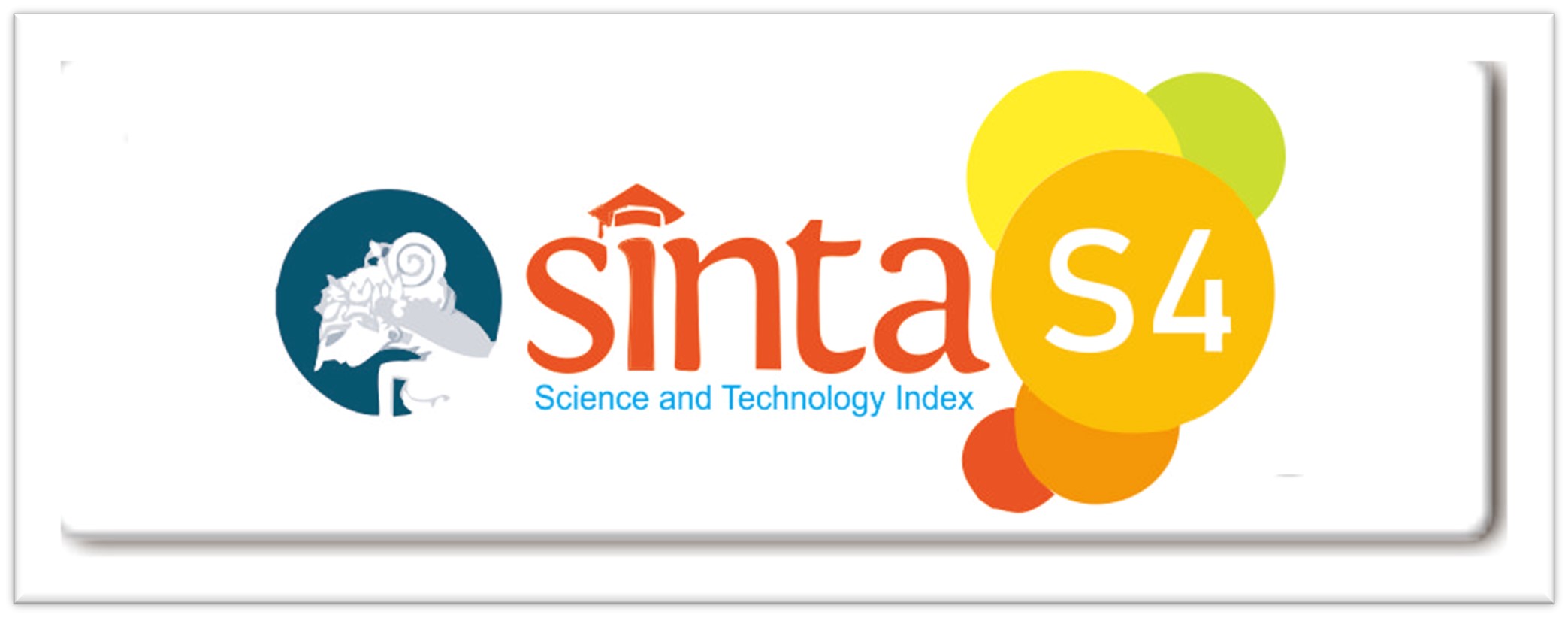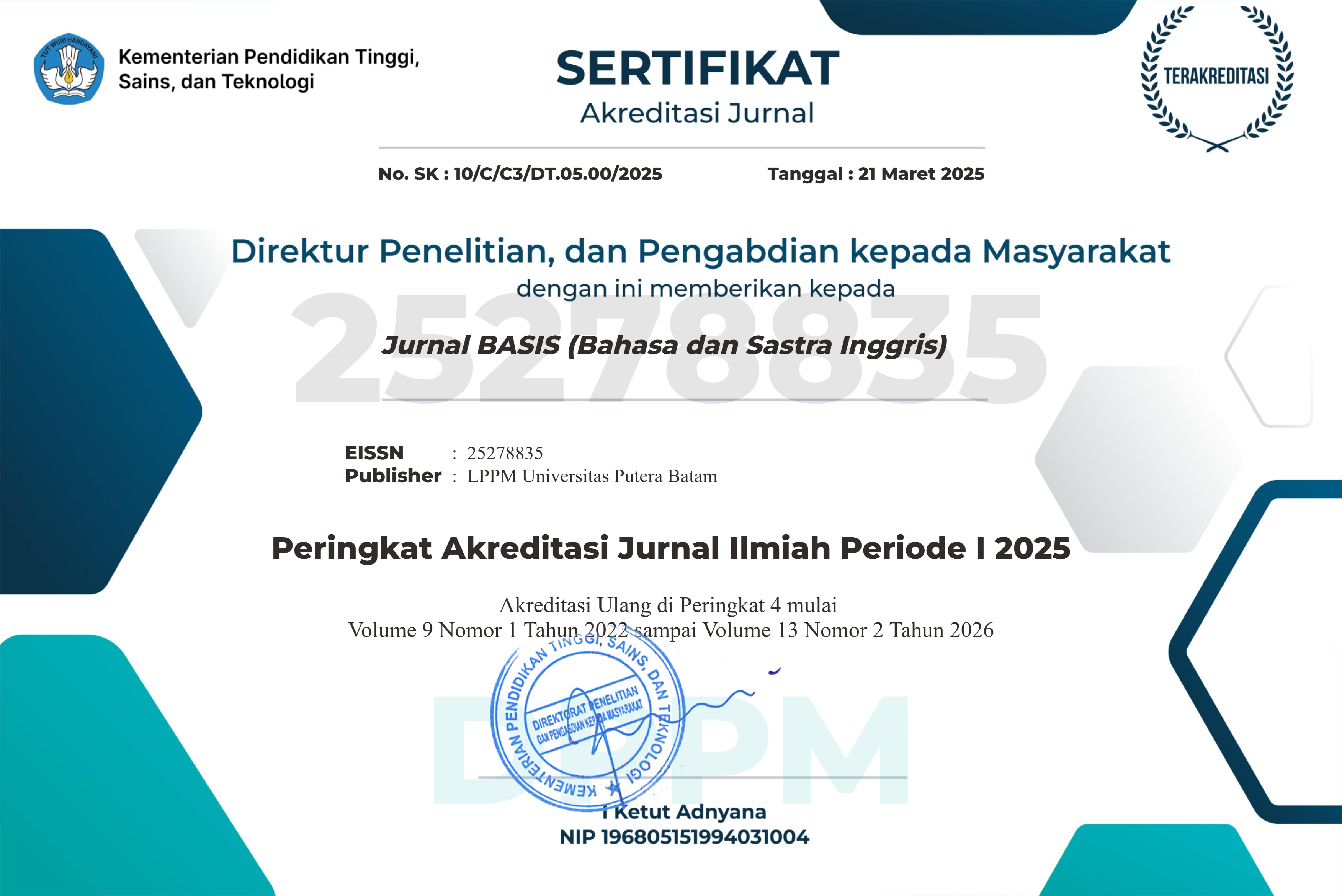ARCHETYPES AND ROMANTICISM IN ESTABLISHING NATIONAL IDENTITY AS REFLECTED IN TOLKIEN’S THE SILMARILLION
REFLECTED IN TOLKIEN’S THE SILMARILLION Emil Eka Putra, emilekaputra@gmail.com, Universitas Putera Batam
Kata Kunci:
fantasy, archetypes, romanticism, nationalism, TolkienAbstrak
This research demonstrates the relationship of fantasy fiction, archetypes, romanticism and nationalism in one of fantasy fiction, namely Tolkien’s The Silmarillion. Since fantasy fiction, with the stereotype of escapism, is less appreciated this article is written in attempt to give more appreciation to fantasy fiction. Analysis to show the relationship of fantasy fiction, archetype, romanticism and nationalism is carried out by applying archetypal approach and Frye’s concept of mythos. This analysis is aimed at determining the position of the story in Frye’s mythos taxonomy and its values. The values, then, are compared with values found in English nationalistic discourse. The result of this analysis indicates that the story of The Silmarillion can be classified as tragic mythos. However, tragedy in the Silmarillion is elaborated differently from the characteristics of the mythos suggested by Frye. Tragedy of The Silmarillion is collective in its nature. The uniqueness of tragedy in The Silmarillion, then, is read as representation of fellowship spirit value in English nationalistic discourse. The Silmarillion also shows wisdom and historical continuity values parallel with values found English nationalistic discourse. From these values The Silmarillion shows that pastoral life with its collectivity, wisdom and tranquility as an ideal life for English people. Further, the revealed values also shows that in establishing England national identity, Tolkien, like his national identity builders predecessor, refers to old wisdoms. He refers to values that are perceived as part of values in previous past gloriuos era. By doing so it can be concluded that in establishing the national identity Tolkien uses the same method with his predecessor; refering back to the previous golden era—a kind of romanticism.
Referensi
Anderson, Benedict. (2006). Imagined Communities: Reflections on the Origin and Spread of Nationalism. London: Verso.
Bassnett, Susan (1993). Comparative Literature: A Critical Introduction. Oxford:Blackwell
Carpenter, Humphrey and Tolkien, Christopher (eds.). 1981. The Letters of J. R. R. Tolkien. London: George Allen & Unwin
Colley, Linda (2005). Britons: Forging the Nation 1707–1837, London: Yale University Press
D’Ammassa, Don. 2006. Encyclopedia of Fantasy and Horror Fiction. New York: Facts On Facts
Dodd, Philip. (1968). “Englishness and the National Culture.” in Robert Colls dan Philip Dodd (eds). Englishness: Politics and Culture 1880-1920, 1-28. Kent: Croom Helm
Fimi, Dimitra (2006). "'Mad' Elves and 'Elusive Beauty': Some Celtic Strands of Tolkien's Mythology". Folklore (West Virginia University Press) 117 (2): 156–170.
Heims, Neil (2004). Great Writers: J. R. R. Tolkien. Philadelphia: Chelsea House Publisher
Hobsbawm, Eric (1992). Nations and Nationalism Since 1780: Programme, Myth, Reality, 2nd ed, Cambridge: Cambridge University Press
Flieger, Verlyn (2004). “Do the Atlantis Story and Abandon Eriol-Saga.” Tolkien Studies: An Annual Scholarly Review, I, 43-68
Frye, Northrop. 2000. Anatomy of Criticism: Four Essays. Princeton, NJ: Princeton University Press.
Jackson, Rosemary. 2001. Fantasy: The Literature of Subversion. New York: Routledge.
Kelleghan, Fiona (Ed.). 2002. Classics of Science Fiction and Fantasy Literature: Vol. 1. Aegypt — Make Room! Make Room! Pasadena, California: Salem Press
Kumar, Krishan 2003. The Making of English National Identity. Cambridge: Cambridge University Press
Petty, Anne C. (2004). “Identifying England’s Lönnrot.” Tolkien Studies: An Annual Scholarly Review, I, 69-84
Shippey, Tom (2007). “Grimm, Grundtvig, Tolkien: Nationalisms and the Invention of Mythologies.” Roots and Branches: Selected Papers on Tolkien, 79-96. Berne: Walking Tree Publisher
Stableford, Brian 2005. Historical Dictionary of Fantasy Literature. Lanham, Maryland: The Scarecrow Press
Sturch, Richard 2000. Four Christian Fantasists: A Study of The Fantastic Writings of George Macdonald Charles Williams C.S. Lewis and J.R.R. Tolkien. Berne: Walking Tree Publisher
Tolkien, J. R. R. (1964, 5 January 2012). On Fairy Stories. http://bjorn.kiev.ua/librae/Tolkien/Tolkien_On_Fairy_Stories.htm#f [25/06/12]
Tolkien, J. R. R. 1977. The Silmarillion. London: George Allen & Unwin Ltd.
##submission.downloads##
Diterbitkan
Terbitan
Bagian
Lisensi













 JURNAL BASIS (BAHASA DAN SASTRA INGGRIS)
JURNAL BASIS (BAHASA DAN SASTRA INGGRIS)
